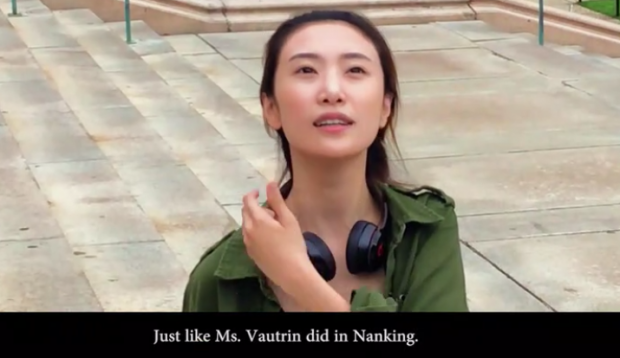Ewing Luo or Luo Yiyun, a 26-year-old girl from Nanjing and graduate student in the United States, is a descendant of one survivor of the Nanjing Massacre. Her grandmother was saved by Minnie Vautrin, a U.S. Missionary who volunteered to provide refugee camps at Ginling Women's College.
This year she used her cellphone and selfie stick to shoot a one-minute film that cost over 100 dollars, in memory of Ms. Vautrin or "Ms. Hua" who saved 10,000 lives. Her film won the first-ever International Emmy's 2017 JCS International Young Creatives Award.
The Peacemaker from Nanking shares the story of a Chinese student born in Nanjing, Lu Yi'an, who will volunteer in Iraq during her summer vacation. As the latest generation of one of the massacre survivors, she wants to follow Vautrin's steps and be a peacemaker.
The director Ewing Luo was born in Nanjing in 1991 and has studied in the United States for over six years. Luo said that her inspiration to make the film was from her grandma who often told her about Vautrin's stories.
The student hopes to speak out voices about Chinese people through similar films.
Minnie Vautrin came to China in 1912 when approached by the Ginling Women's College to serve as the Dean and Director of Teaching and Education. From 1919 to 1940, Vautrin was a teacher in the college and became the acting dean twice.
During the Nanjing Massacre tragedy, she had chosen to stay as a member of the International Committee of the Red Cross and the head of Ginling College refugees, shelter and protection for more than ten thousand women and children.
At the same time, Minnie Vautrin's Diary is an important historical material. From August 12, 1937, to April 1940, Vautrin described Nanjing day life almost every day in the way of a diary.
In 1938, the national government also awarded her highest honor rewards for a foreigner, the blue, white, red three-color Emblem of the Blue Jade. In the Nanjing massacre, during those dark days, Vautrin became a "patron saint" in the eyes of the Nanjing refugees, and was regarded by the people as the "living Buddha." Even in the darkest days of the mass murder, Vautrin also did not waiver or despair. But the suffering continued to ferment in later days which gradually overwhelmed her nerves. She had suffered from severe depression and on May 14, 1940, she returned to the United States. On May 14, 1941, Minnie was only 55 years old when she committed apartment kitchen gas suicide.
Minnie said last words: "If I I had two lives, I would still be willing to serve the Chinese." In Vautrin's tombstone, with China's official script written on the four Chinese characters, it says, "Eternal life in Ginling."
"A young person considers more about what mark the war has left on modern society and young people. Actually, Americans and Chinese people in the United States don't know 'Ms. Hua' or quite well about the historical event Nanjing Massacre. At the mention of the agony of World War II, many people's first thoughts are about Jewish people and even those who saved them. Why? Because those literary works like Schindler's List repeatedly give an account of the issue as a reminder. By comparison, the misery history of Chinese people during World War II is absent in the literature." Luo said in a recent interview with the Beijing News.
Regarding the film as a small beginning for Chinese people to tell their history and promote peace, she added, "Now more and more Chinese young people walk on the world stage. Inheriting history from the older generation, we walk out of the pain of history and repay the history by the involvement in international affairs in a more positive attitude."
- Translated by Karen Luo












